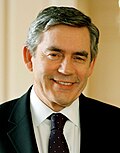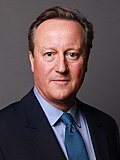Production history
West End (2013)
The Audience is written by British playwright and screenwriter Peter Morgan. [5] Its premiere production opened in the West End at the Gielgud Theatre on 15 February 2013, with its press night on 5 March. [6] The play featured Helen Mirren as Queen Elizabeth II; the actress had played the same role in the 2006 film The Queen , which was also written by Morgan. [7] The play was directed by Stephen Daldry, [8] with costume design by Bob Crowley, [9] lighting design by Rick Fisher, sound by Paul Arditti, music by Paul Englishby and video design by Ian William Galloway. [10] A typical West End performance ran two hours and 30 minutes, including one interval. [11]
Following the death of former prime minister Margaret Thatcher, who is featured during the play's run, Morgan made a speech to the audience to mark her death. [12] Subsequently, a reference to the late prime minister's death and the Queen's attendance at her funeral was added as a part of the Queen's dialogue with David Cameron. The production was broadcast live to cinemas as part of National Theatre Live on 13 June 2013. [13] The initial broadcast broke the record for most people watching a production live since the scheme began, with nearly 80,000 people watching in the UK and 30,000 people in North America. [14] Further encore screenings were later broadcast. [15]
West End Revival (2015)
A West End revival began at the Apollo Theatre, opening on 5 May 2015, following previews from 21 April 2015, [19] with Dame Kristin Scott Thomas as Queen Elizabeth II. [20] For the 2015 production, the role of James Callaghan was removed to allow them to feature former prime minister Tony Blair, and the script was updated pending a general election. [21] Following the election on 7 May 2015, the scene featuring David Cameron meeting the Queen was updated to show Cameron had won a second term and showed the Queen asking him to form a government. [22] [23] The audience between Cameron and the Queen was changed several times over the 15-week run in the West End to keep up to date with current political events. After the general election results, references were made to Nicola Sturgeon and the success of the Scottish National Party winning seats from the Labour Party. Other current events references made during the audience scene between the Queen and Cameron included the corruption scandal at FIFA and the Greek bailout debate known as "Grexit". During the last week of the run, a reference was made to newspaper articles displaying the Queen apparently making a Nazi salute in her youth and to the birthday of Prince George.
Moscow (2017)
In May 2017, the play received its Russian premiere in Moscow and starred Inna Churikova as the Queen, along with Mikhail Gorevoy as Winston Churchill and Galina Tunina as Margaret Thatcher. [24]
In popular culture
The 'Traviata' model handbag by British designer Launer London received a surge in popularity and was subsequently re-issued by the brand following the use of one as a prop in The Audience both in the West End and on Broadway. It is the style often used by Queen Elizabeth II. [26] [27]
Specific episodes of the Netflix series The Crown, created by Peter Morgan, acknowledge inspiration from The Audience, produced by Playful productions LLP, Robert Fox LTD and Andy Harries. The play is cited in the credits of the first, fifth and eighth episodes of season 1, the third and eighth episodes of season 2, the second and ninth episode of season 3, and the second, fifth and tenth episode of season 4.
This page is based on this
Wikipedia article Text is available under the
CC BY-SA 4.0 license; additional terms may apply.
Images, videos and audio are available under their respective licenses.








